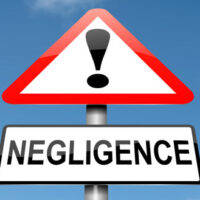Determining Negligence in a Personal Injury Case

The success or failure of a personal injury claim depends largely on whether a claimant can prove that someone else was responsible for his or her injuries. Making this legal determination, however, can be difficult, as it requires proof that four specific elements have been met. To learn more about these elements and the strength of the evidence in your own case, please contact our experienced Fort Lauderdale personal injury lawyers today.
Duty of Care
The first element that is required to prove negligence is whether a defendant owed a duty of care, which is a term used to describe the legal obligation of trying to avoid causing injury to another person, to the plaintiff. While in most situations, all people owe some degree of care to others, there is often ambiguity about the duty of care and its scope in some cases. For instance, business owners are required to exercise reasonable care to ensure that their customers are protected from injury while on their property. What types of steps satisfy this condition, however, can be difficult to ascertain. These kinds of scenarios make it especially important for those with injury claims, to speak with an experienced attorney about their case.
Breaching the Duty of Care
Once it is determined that a person owed a duty of care, the next step in determining whether someone was negligent is to decide whether the person who owed the duty of care actually fulfilled it. If it is determined that this duty was not only not fulfilled, but also breached, he or she could be found liable for negligence. Essentially, the responsible party could be held legally responsible for an accident if he or she created a hazard by failing to take the actions that most people would take in the same situation. Proving what a defendant did or did not do during an accident plays a crucial role in determining whether this element has been fulfilled.
Causation
The third element of a negligence claim is causation, which means that claimants must be able to prove that someone else’s actions caused the harmful event in which their injuries were sustained. It is not enough to simply show that a defendant was negligent. Instead, claimants must be able to prove that the defendant’s negligence was the cause of their injuries.
Damages
The fourth element of a negligence claim involves proving that a claimant suffered a measurable physical and emotional injury as a result of a particular accident. Proving damages will require evidence of lost wages, property damage, and physical injury, all of which are combined to determine how much a case is worth.
Determining Negligence with the Help of an Attorney
Demonstrating negligence isn’t always easy, which is why many accident victims are strongly encouraged to speak with a reputable and experienced personal injury lawyer before actually filing a claim. Call 954-566-9919 today to speak with one of the dedicated Florida attorneys at Boone & Davis about your case, the damages involved, and the potential grounds for alleging fault for your accident.
